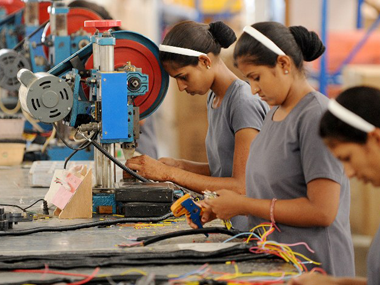While talks around bridging the gap between men and women have gotten louder, the world has slowed down in closing it, suggests data. It would take at another 170 years to bridge the gender gap in terms of pay and workforce, says a new report published by the World Economic Forum on 25 October. [caption id=“attachment_3074534” align=“alignleft” width=“380”] Representational image. Agencies[/caption] According to
The Global Gender Gap Report 2016, the rate of bridging the economic gap between men and women has slowed dramatically with the gap – which stands at 59 percent – now larger than at any point since 2008. It had reached its peak in 2013, the report said. In 2015, report data had suggested that the economic gap could be closed within 118 years, or 2133. The Global Gender Gap Report is an annual benchmarking exercise that measures progress towards parity between men and women in four areas: educational attainment, health and survival, economic opportunity and political empowerment. The report has named a number of reasons including disparities in salaries, a stagnant labour-force participation (only 54 percent of women join the workforce, as compared to 81 percent of men), and low number of women in senior positions even though “95 countries around the world now have as many — if not more — women educated at university level”. The study points that “women around the world on average earn just over half of what men earn” even though on an average, “they work longer hours”. A
report on the forum’s website, however, says that the world has improved in bridging the gender gap in health, education, economic opportunity and politics. “If current trends continue, a baby girl born today will only see the gender gap in health, education, economic opportunity and politics completely close around the world if she lives to 83,” it said. The report also published a list of top 10 performers in terms of gender equality among the 144 countries it studied as part of the report, and there remain “huge differences in the opportunities for women in the best and worst performing countries around the world,” it said. The report also added that “smaller European countries, particularly Nordic nations, continue to occupy the top four positions in terms of Gender equality”. Interestingly, Rawanda (rank five), the only African country in the top 10, managed to close 80 percent of its gender gap, overtaking Ireland (rank six). Phillipines, the only Asian country in the list was ranked seven whereas Nicaragua remained the best performer in Latin America and the Carribean at ten, just behind New Zealand at nine. In terms of improvement, “Nicaragua tops the most improved list, too, ahead of Nepal and Bolivia. It has fully closed the gender gap on areas like educational attainment and health and survival indexes, and ranks fourth in the world on political empowerment, with more than 50 percent of its political gender gap now closed”, the forum said on its website. Nepal also made notable improvements on the political empowerment index, as well as on literacy and wage equality at 11 percent, beating neighbouring India which made an improvement of just 8 percent. India is among the top 10 countries in terms of improvements, however, it was one of the three lowest-ranked countries (including Armenia and China) in terms of closing gender gap on the health and survival subindex.
While talks of bridging the gap between men and women have gotten stronger, the world has slowed down in closing it, suggest data. It would take at another 170 years to bridge the gender gap in terms of pay and workforce, says a new report published by the World Economic Forum on October 25.
Advertisement
End of Article


)

)
)
)
)
)
)
)
)



